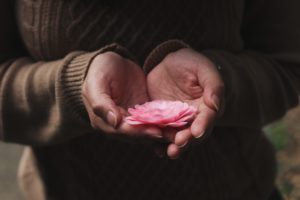by Jenny Rose | Feb 22, 2018 | Choice, Power
A small clay sculpture of a woman with her hands cupped in front of her chest sits on my desk. She holds a tiny clay bird and is surrounded by a couple of crystals, a piece of amethyst and a small geode. This little altar has been my daily companion for years. Wise and smiling, round and nurturing, the sculpture has comforted me through many losses, grief and rage. She’s one of my greatest treasures.

Letting Go
These days, the bird she holds is perched on the rim of the wooden dish she sits on, looking out at the room, at the world, at me. It can stay, or it can fly away. For now, it’s content to sit, watching and listening, as I live my life in these two small rooms at the top of our sagging farmhouse.
I have placed tiny polished garnets in the woman’s cupped hands where the bird once nestled.
I had a friend, dear and wise, in my old place who once said to me if we open our hands and let something go, and keep our hands open, something new will come and fill them. As she spoke, I again saw the image of an open hand, generous, allowing freedom, and prepared to welcome and support the next thing, and the next.
Letting go is power. Letting go is serenity. Letting go is an authentic act of love toward self and others. The usefulness of letting go is not a secret. Almost any self-help book out there talks about it as an aspect of healthy functioning, but I think popular psychology doesn’t explore it deeply enough.
Letting go doesn’t mean we brush aside our feelings. Not at all. Unexpressed feelings cement us in place. We all know people who remain frozen in time because of a death or traumatic event. Years and decades pass, but they don’t heal. They don’t move on. Their emotional growth is arrested. This is what unfinished emotional business looks like. Unexpressed feelings can’t flow through us and dissipate so we can release them.
We know very little about appropriately expressing our feelings in this culture.
Feelings aren’t thoughts. They’re not stories, expectations, beliefs or ideology. They’re not labels or rules. Like it or not, admit it or not, we’re physiologically wired for feelings, and they give us good information about how things are with us. Our thoughts and beliefs, on the other hand, are frequently distorted, confused, misinformed, outdated or otherwise unreliable.
That’s where letting go comes in.
We’ve all had events in our life that left deep scars. We’ve all seen things we can’t unsee, heard things we can’t unhear and done things we can’t undo. We’ve all felt disempowered or victimized at one time or another. Death and disaster enter our lives with no warning and take those we love.
Some people move on from such events with more grace than others. I suspect part of that grace has to do with forgiveness. Not forgetfulness, but forgiveness of self and others. I suspect another part is the ability to fully experience and express the feelings attached to the event. That requires a certain kind of support, and many folks don’t have it. Some people simply don’t choose to move on or let go. They center their thoughts, feelings and energy in the event, whatever it was, and they hold it tight, cherishing it, feeding the fire of their pain, keeping their scars open with the razor blade of their attention and focus. It becomes part of their identity, part of their story, a grievance to cling to, a betrayal to treasure, a wound to worship.

Photo by Andrey Grinkevich on Unsplash
I have a book called Clean Sweep, by Denny Sargent. It’s filled with rituals and instructions to help us let go of what no longer serves us. The author outlines a banishing exercise in which he suggests the reader visualize holding tightly to a thorny branch. In my own version, the branch is heavy, so heavy I can hardly hold it, which drives the thorns deeply into my flesh. The branch is a person, event, memory or belief that gives us emotional pain. We can make an easy choice and cling to it, cradle it, embrace it, let it tear our skin and make us bleed. We can make a harder choice and set it down, open our hands and let it fall. We can walk away from it. We can burn it or bury it.
In order to let go, we have to be willing to surrender control and endure loss. Letting go of a core piece of identity, a long-held belief or a painful memory is difficult work, even when that core piece, belief or memory gives us great pain. Letting go will leave a hole. Then what? Then who are we? How do we fill that hole? How do we understand ourselves and our place in the world? This is scary stuff.

Photo by a-shuhani on Unsplash
Aristotle said nature abhors a vacuum. My friend was right. If we open our hand and release what we’re holding, something else will come, though we can’t predict or control what it might be. In fact, the thing released might return to us in another form. We can’t know. We’ll never know unless we release our need to control. We’ll never find out what might perch on our open hand if we’re not willing to walk through loss in order to reach gain.
I’m having a long and involved break up with my desire to control. Some days I go all day without thinking about it, and other days I want to micromanage everyone and everything in my life. Some days I feel light and free, a confident and lovely woman, and other days I feel like a grubby three-year-old hiding under the covers sucking my thumb because nothing and no one is the way I want them to be. I sulk and pout and snarl and I feel crushed by the thorny weight of my need to control.
Then, at some point, my eye falls on my little clay wise woman and her cupped hands and wide-open heart, and I say, “Oh, yeah. That’s right. Letting go.”
I feel annoyed when people tell me to “get over it.” First of all, I have a right to my feelings, and secondly, it’s not that easy. Letting go, for me, is a practice, and I need time to engage in it. Sometimes I go back and find my leaden armful of hawthorn or bramble or locust and hold it again for a while, opening up all the old wounds, exhausting myself, hurting myself, and, finally, opening my hands and letting it fall again. Sometimes I need to design a ritual for letting go, a prayer or a dance or some kind of purification rite. Sometimes I need to make a physical resting place, like a grave or a patch of garden or a newly-planted tree in order to let something go. For me, taking time to honor whatever it is I’m trying to release is helpful. Whatever it is that no longer serves, it was once a part of my life and experience. Laying things to rest in this way helps me release them fully and finally.
When it comes right down to it, this blog has been an exercise in letting go as much as anything else.

Photo by Ester Marie Doysabas on Unsplash
When we know how to let go, we increase our power, as well as the power of others. Often, what we desperately hold onto is people. This is a strong archetype in old stories; locking the beautiful maiden in the stone tower to “protect” her. Part of love, as any seasoned parent will tell you, is letting go. Imprisoning, disempowering and trying to control others isn’t love. Refusing to let go of someone isn’t love.
Releasing our grievances with others frees them as well as ourselves. Being willing to accept an apology, an explanation, and the imperfections of others allows us all to move forward with lighter loads. The stories and memories we hurt ourselves with are often ghosts, events involving people who are long dead and far in the past. We can choose to bless them and lay them to rest.
I don’t want to haul around painful memories, toxic garbage, the futility of trying to control life and ineffective behaviors and beliefs. I can’t swim with all that tied to my ankle. I can’t dance. I can’t embrace anything or anyone with an armful of brambles. I can’t create with a heart full of thorns.
I want to be free.
I open my hands.

Photo by Stephen Leonardi on Unsplash
Make a Boat
Make a boat
out of who you are
not what you have.
If you don’t know who you are
(Search for the desert between the worlds.
Find Bone Mother.
Recollect.
Reassemble.
Bathe in soul.
Birth yourself.)
That is another journey.
Your boat will be small.
You can take no one.
You can take no thing.
Shape your boat with your truth.
Shape it with the joy in your hands
and the wisdom in the soles of your feet.
Make a chisel of rage and grief.
Sand with the grit of clarity.
Stain with blood.
Oil your boat with the moisture and musk of your sex.
Stitch the rags of your life into a sail.
Weave rope from your hair.
Take your time
And remember
Fear does not float.
When you know the boat is ready,
Sit in it.
Lay the backs of your hands on your knees.
Open your hands.
Let everything go.
Let everything go.
Keep your hands open
So that new things may come.
Without fear
Ask the one who stands just behind your shoulder
The one who shelters your life in the shadow of her wing
To come forward.
She will guide the boat.
Surrender yourself to your boat,
to the water,
to your guide.
Find your breath.
Stay there.
Find your heartbeat.
Stay there.
Keep your hands open.
Rest.
Don’t stand up in the boat!
Don’t throw yourself out of the boat!
Don’t you want to see where you are going?
Look. See how the feathers on her wing
trail in the water?
All content on this site ©2018
Jennifer Rose
except where otherwise noted
by Jenny Rose | Jan 25, 2018 | Power
Arguing with what is.
Possibly the most fruitless endeavor in the world.
Yet many of us consistently argue with how we are, how others are, and how the world is.
Arguing with what is is like living in an unending war. Clinging to a story inconsistent with what is requires constant vigilance. Our lives begin to revolve around the fear that the truth we refuse to acknowledge will escape or be exposed.

Photo by Ian Espinosa on Unsplash
We cannot allow that to happen, so we put all our energy into convincing ourselves that what is isn’t. Then we start trying to persuade others to validate our particular reality because God speaks to us, or we’re especially victimized, marginalized, enlightened, rich or powerful. If we can’t persuade others, we try to create and enforce rules requiring them to fall into line, to agree, at least tacitly, with our point of view and belief system. We scorn critical thinking, science and evidence-based data. We discourage questioning, careful definitions and nuances. We create jargon, acronyms, blacklists and smear campaigns. We enlist the sympathy, empathy, kindness and compassion of well-meaning but naïve people. We set up zero sum games, use gaslighting, violence, abuse, projection, deflection, sweeping and inaccurate generalizations and distortions. We hurt ourselves, and we hurt others.
Arguing with what is is a full-time job.
My particular version of arguing with what is takes place mostly in my head. For example:
I don’t feel loved.
What? How can you say that? Remember that one kiss at the beginning, the most passionate kiss of your life? You know you want that again! Think of how funny he can be, how charming, how much fun! If you don’t feel loved it’s because you’re not trying hard enough. You’re ungrateful. You’re disloyal. You’re a bad partner. You don’t deserve him. You want too much. You’re needy and demanding. Of course he loves you, he’s just not comfortable saying it! You are happy and loved. Get a grip!
I don’t feel happy or loved.
I had this ding-dong conversation with myself for years. I desperately and repeatedly tried to convince myself I was both happy and loved, but I could never quite silence that deep internal voice that went right on saying, “I don’t feel loved.” It wouldn’t shut up. After years of this nonsense, I finally got so exhausted I stopped arguing with my true feelings and ended the relationship. Then, one day I came across narcsite dot com and immediately recognized the narcissist-empath dynamic.
You know what? I was right. I didn’t feel loved because I wasn’t, in fact, loved.

Photo by Travis Bozeman on Unsplash
Arguing with what is means fear and self-doubt are my constant companions.
So what’s the other side of the coin? What’s the fix for arguing with what is?
This magical phrase: However this needs to be, it’s okay with me.
Say it aloud: However this needs to be, it’s okay with me. Is it a lie? It usually is a lie for me when I first apply it to any given situation. I want things to be predictable, controlled and adhere to my expectations and standards. I expect that of myself, of others and of the world.
I haven’t had great luck with that expectation. The rebellious world is chaotic, unpredictable and unexpected. I’m not in charge of anyone but myself, and my feelings (along with the rest of me) are disobedient and refuse to be controlled.
My need for control and predictability are rooted in fear and lack of trust in myself. If, at any moment in any day, however things need to be is not okay with me, I know I’m dealing with fear or lack of self-trust, and those are both places where I have all the power. That instant refocus from avoiding, denying or refusing an inconvenient or unexpected truth or reality over which I have no power to the very center of my power clears away anxiety, confusion and fear. What happens in me, in a day, or in the world is not really the problem. The problem is in the way I manage my power and my choices. Addressing my own power and choices allows me to say, with perfect truth, that however this needs to be, it’s okay with me.
Being okay with the ways things are doesn’t mean endless love, light and turning the other cheek. It doesn’t mean I accept boundary violations, bullying, coercion, violence or any other kind of power-over games. It doesn’t mean I tip-toe through life pleasing others, following rules and keeping silent. It doesn’t mean toadying to the political correctness police. It doesn’t mean I feel no frustration or disappointment, or that the status quo should remain unchallenged and unchanged. It means clarity about where my power is.
Nobody wants a flat tire, herpes, an unwanted pregnancy, a cancer diagnosis, mental illness, the flu or to lose a loved one. We don’t want superstorms that wipe out our homes, the uncertainties and anxiety of climate change or food and water shortages. Nobody voted for lead in their drinking water, or to experience genocide. Nobody wants to be silenced, attacked, abused, marginalized, shot or scapegoated.
Yet all these things are. They’re real, along with many magical, wonderful things, and I can’t change the way things are.

Photo by Ludde Lorentz on Unsplash
I can only change the way I am. I can decide when and how to speak. I can decide how I interact with others. I can listen, learn, research, ask questions, think critically and decide where I stand on important issues. I can speak up for those without voices. I can pay attention to my own integrity and operate within it. I can disengage, refuse to pick up poisoned bait, move away from where the blow is going to land (sometimes) and learn self-defense.
I can say no.
I can learn to trust my own courage, willingness to love, intelligence, feelings and ability to adjust and adapt to whatever happens. I can choose confidence and curiosity as companions.
I can make sure that however I need to be, it’s okay with me.
I can surrender to others in all their strengths and imperfections. Each one of us is however we need to be, sick or well, destroyer or hero, weak or strong, power-over or power-with. People in the world are okay with me, and I choose who I engage and connect with, who I support or hinder, who I share power with, who I collaborate and cooperate with and who I allow in my life.
However this minute, this hour, this day needs to be, it’s okay with me. If I catch the flu, it’s okay with me (Ugh). If I can’t get out of the icy driveway to go swimming, it’s okay with me (Rats!). If I reread the rough draft of this post and decide it needs to be rewritten before tomorrow when I post, it’s okay with me (what a pain in the neck!)
I can accept what is, deal with it, and go on.
Or I can argue with what is.
It’s a chocolate-or-vanilla choice, and we make it a hundred times a day.
Whatever you choose, it’s okay with me.
And So

Photo by freestocks.org on Unsplash
And so, after all, it was no use,
That desperate determination to please.
In the end a hidden, untamed thing
Always looked out of my eyes,
Beseeching for freedom,
And none of us could beat it down.
Now all the rigid outlines of my life
Have fallen around my feet in graceful folds.
I’ve counted silver threads and lines
And granted freedom.
If there’s no lover for what I am
I can kiss my own shoulders.
All content on this site ©2018
Jennifer Rose
except where otherwise noted
by Jenny Rose | Dec 21, 2017 | A Flourishing Woman, The Journey
Yule, the winter solstice, is upon us once again. This year, here in the deeps of darkness, I’m thinking about The Fool’s journey.

The Fool, by Emily Balivet
The Fool is an archetype, a recurrent symbol in mythology, folklore and story. Jack of Jack and the Beanstalk is a Fool. The Fool shows up as a simpleton, an innocent, one who is ignorant, inexperienced and silly. Archetypes have two sides, shadow and light. In modern culture The Fool has been reduced to its shadow, its most negative attributes, an insult, a curse and a contemptuous label.
But the old tales hint at a deeper, older meaning of the archetype. In fairy tales, The Fool is often the youngest sibling, the least able and powerful character, who nevertheless becomes the only one to successfully complete the task or quest. Often, The Fool has a good heart, or some extraordinary purity of character that allows him/her to be successful. The Fool has faith in magic, in talking birds and beasts, in the advice of old women, in objects given by peddlers at crossroads. To be a fool is to be held in a circle containing everything and nothing, to be without judgement, rules, expectations, cynicism or fear. The Fool is an archetype of youthful energy, bright, glowing and optimistic, filled with hopes and dreams.
Characters of this archetype set out, sometimes exiled or driven from their home, sometimes volunteering to go, with nothing but their shining confidence, intuition and willingness to do a task or find a solution. They rarely have external resource, but carry a great wealth of internal assets, including, interestingly, a kind of innocent cleverness that arises from authenticity and the simplicity of great integrity. The Fool has everything she or he needs in the form of untapped, chaotic potential.
It seems to me we’ve lost sight of the sacred role of The Fool. We kill foolish behavior with punishment, restriction, control, mocking and tribal shaming. We teach our children to avoid playing The Fool by making “good” choices. We avoid looking or feeling like fools. Foolishness is equated with immaturity, irresponsibility and naiveté. We resist being wrong or admitting we made a mistake. Playfulness is no longer a priority.
I see The Fool as an essential first step in The Hero’s journey. It’s where we all start as we undertake any new experience or endeavor. All Heroes start out as Fools, and perhaps all Fools are also Heroes. The Fool archetype creates space in which we learn resilience, strength, courage and creative problem solving. In the gap between The Fool’s happy hopes and dreams and reality is the place where Self is shaped, and the more fully we embrace this archetype, the more of our own potential we realize.

Photo by Dan Gold on Unsplash
That’s what I believe, when I think carefully about it, but that’s not how I show up in the world.
I hate to feel like a fool. Humiliation is one of the most uncomfortable emotions I experience. I dread appearing irresponsible or naïve. I’ve bought into the cultural definition of foolishness equaling stupidity, and I don’t want to be perceived as stupid. I’ve been warned at the beginning of every Fool’s journey I’ve embarked upon with head shaking, patronizing smiles and dire, ominous warnings: “You have no idea how hard marriage is.” “Boy, is your life going to change!” “You’re going to hate it!” “You’ll find out I was right!” “It won’t last.” “Nothing will ever be the same.”
As a parent, I shook my own head, smiled patronizingly and issued warnings. I wanted to protect my sons from “bad” choices, from danger, from illness and injury and from the pain of disillusionment and disappointment, the very things that help us figure out who we are.
The Fool is an archetype precisely because it’s so persistent and present in our lives. It’s our nature to go into the world and explore, seek, complete tasks and engage in quests. I wonder what it would be like if we all framed The Fool’s journey as sacred space, as a necessary and beautiful rite of passage, filled with potential and promise. In that case, revisiting this archetype throughout our lives at any age could be viewed as a chance to refresh our willingness, consent and curiosity about ourselves and what might be possible, a chance to apply the skills we’ve learned in our previous cycles as The Fool rather than stay frozen in bitterness, shame, regret and fear.
It’s true that every new journey is a risk. None of us could have imagined what it would be like to be an adult, to fall in love, to get married, to have children, to move across the country, to get the perfect job, to battle illness or injury, to age. Dire warnings and ominous predictions are pointless and useless as we navigate in our lives. Sincere and simple congratulations from others; faith in our own intuition, intelligence and strength and the experience of unconditional love and belief in our abilities from friends and family is what we need as we push forward in search of new horizons.
Yule signals the return of the light and new beginnings. We all embark on a new cycle, and none of us knows what it will bring. The Fool is tying together a bundle of food and setting out, following a new road into an unknown place, exploring, perhaps searching for something. Interested, curious, fearless and confident, The Fool walks into the future as the light strengthens once more.

Photo by yatharth roy vibhakar on Unsplash
All content on this site ©2017
Jennifer Rose
except where otherwise noted
by Jenny Rose | Oct 26, 2017 | A Flourishing Woman, Mind
I went to the dentist last week. I spent the usual hour with the hygienist and then the dentist breezed in to give me four or five minutes of exam, comment, teaching and friendly conversation. Thankfully, I don’t require more than this, as my teeth are in excellent shape. In the course of those few minutes, I used the term “permaculture,” and he asked me what it was. I gave him a brief answer, and on the way out the hygienist said I had a “high dental IQ.”
“She has a high IQ, period,” he responded as he left.
I almost got out of the chair and went after him to explain that I’m the dumb one in the family, and certainly don’t have a high IQ.
As I’ve gone about life since then, I’ve thought a lot about that interaction. I’ve also been feeling massively irritated, isolated and discouraged. This morning I woke out of a dream of being in a closet groping for my gun, my knife, even my Leatherman, absolutely incandescent with rage, because a man outside of the closet was having a dramatic and violent meltdown, intimidating everyone present because of something I’d said or done that he didn’t like.
I wasn’t intimidated. I was royally pissed off.
When I had my weapons assembled, I stormed out of the closet and came face-to-face with a clearly frightened woman who was wringing her hands and making excuses for the behavior of the yelling man. I screamed into her face that he could take his (blanking) opinions and shove them up his (blanking blank) and unsheathed my knife, not because of her, because of HIM.
I woke abruptly at that point and thought, I’m not depressed, I’m MAD!

Photo by Nicole Mason on Unsplash
While I showered and cooked breakfast I sifted through IQ and conformity and cultural and family rules, economic success and failure, work, invalidation and silencing and keeping myself small. I thought of how pressured I’ve always felt to toe the line, be blindly obedient, follow the rules, ask no questions and be normal. Normal, as in compliant, and refraining from challenging the multitude of life’s standard operating procedures that “everyone knows.” Normal, as in not daring to resist, persist, poke, peel away, uncover. Normal, as in never, NEVER expressing curiosity, a thought, an experience, a feeling or an opinion that might make someone uncomfortable. Normal, as in never admitting that the way we’re supposed to do things doesn’t always work for me, and frequently doesn’t appear to work for others, either. I slammed around the kitchen, turning all this over in my mind, letting the bacon burn, and finally pounced on a keystone piece to write about.
What does it mean to be smart? Why do I feel like a lying imposter when someone makes a casual comment about my IQ? Why is IQ even a thing? Why does so much of my experience consist of “sit down and shut up!”?
Intelligence is defined on an Internet search as “the ability to acquire and apply knowledge and skills.” Please note the absence of any kind of test score in that definition. Likewise, there’s no mention of economic status, educational status or social status. Also, this definition says nothing about intelligence as a prerequisite for being a decent human being.
The definition takes me back to the playing field in which I wrote last week’s post on work. Here again we have a simple definition for a word which is positively staggering under assumptions and connotations.
Fine, then. I’ve explored what work means to me. What does intelligence mean to me?
Intelligence means the ability to learn, unlearn and relearn. Good learners do not sit down and shut up. We question, and we go on questioning until we’re satisfied with answers. We try things, make hideous mistakes, think about what went wrong and apply what we learned. We don’t do the same thing over and over and expect a different result. We exercise curiosity and imagination. We pay attention to what others say and do and how it all works out. We pay attention to how we feel and practice telling ourselves the truth about our experience. After a lot of years and scar tissue, we learn to doubt not only our own assertions, beliefs and stories, but everyone else’s as well. We practice being wrong. We become experts in flexible thinking. We adapt to new information.
We give up arguing with what is.
Intelligence endures criticism, judgement, abuse, taunts, threats, denial and contempt. It’s often punished, invalidated and invisible. Intelligence takes courage.

Photo by Cristina Gottardi on Unsplash
Intelligence is power. It does not sit at the feet of any person, ideology, rule or authority and blindly worship. It retains the right to find out for itself, feel and express its own experience, define its own success, speak its truth in its own unique voice, and it remembers each of us is limited to one and only one viewpoint in a world of billions of other people.
Intelligence is discerning the difference between the smell of my own shit and someone else’s.
For me, intelligence is a daily practice. It’s messy and disordered and fraught with feeling. It means everything is an opportunity to learn something new. Everything is something to explore in my writing.
I have no idea what my IQ is, and I don’t much care. I’m sick and tired of all the family baggage I’ve carried around about who’s smart and who isn’t and how we all compare. Honestly. What am I, 10 years old? Enough, already.
I’m also fed up with being silenced, and in fact I’ve already refused to comply with that, as evidenced by this blog. I understand a lot of people don’t want to deal with uncomfortable questions. Too bad. Those folks are not going to be my readers. It’s not my job to produce sugar-coated bullshit that can’t possibly threaten or disturb anyone.
So there it is. The practice of intelligence.

Photo by frank mckenna on Unsplash
All content on this site ©2017
Jennifer Rose
except where otherwise noted
by Jenny Rose | Aug 3, 2017 | A Flourishing Woman, The Journey
I’ve been blogging now for a year.

Photo by Markus Spiske on Unsplash
I remember the first time I stood on a high diving board as a kid. The safe haven of the water was impossibly far away. I did eventually jump, but I stood, hesitating, for a long time.
Beginning to blog was like that. Could I manage the technological learning curve? Would I have time to do a good job? Did I have anything to say? Would I have to deal with spammers, hackers, hecklers and hate mail? Would anyone read it? And, the biggest Boogeyman of all, what would people think when I revealed who I really am?
I researched. I read dozens of articles on blogging. I made lists of do’s and don’ts. I bought a book on blogging.
I hesitated. I worried. I doubted myself. I clung to limits, obstacles and fears.
Then, in the middle of a personal and emotional catastrophe, the very last time I would have chosen or planned such a risky, frightening new endeavor, I suddenly started. I suppose I felt I had nothing more to lose.
This summer I’ve been taking stock of what I’ve created, what I’ve learned, my long list of mistakes and my intentions for the future. I’ve been a member of She Writes and Medium. I follow several other bloggers. I went into my Favorites and deleted most of my Blogging folder and then started filling it up again with new articles on Intermediate blogging.
There are hundreds, if not thousands of articles about blogging on the web. What I notice is 19 out of 20 are geared to successful blogging, which is to say blogging with the most possible likes, looks, shares, clicks, referrers, subscribers, advertising and side bar businesses, all of which can translate directly into income for the blogger. The Holy Grail is to go viral with your blog. To this end, the advice is repetitive. Use sentences of five words or less. Use short paragraphs of two or three sentences. Use lots of images, video, bullet points, colors, fonts and section titles. Keep your posts short and to the point. Carefully construct a title that will result in as many clicks as possible. Convince the reader you have something of value they need. Don’t be emotional or personal. You can’t be successful unless you have several active social media accounts.
I read, saved, took a few notes, and then realized I didn’t want to do most of what these articles said I should do. I paused and thought about that for a couple of days. I looked at my stats. I talked with my partner. I groped for a bottom line.
I absolutely love blogging/writing.
Why?
Because when I do it I’m real. Every single week I write about something real. Most weeks I struggle with what other people might think, but at the end of the struggle I again choose to be seen. I stare down that fear of using my voice and speaking up. I’m taking my power back, week by week, post by post, line by line.
Blogging and writing are my way of building bridges and fostering connection, to myself, to others, and to life. It’s the medicine I can offer to aid in healing. It’s my hug, my love letter to the world, my kiss of peace. It’s my outstretched hand, regardless of whether or not others choose to clasp it, ignore it or spit on it.

Photo by Alona Kraft on Unsplash
My feeling of success about writing a book and creating a blog isn’t attached to any of the general markers of success among bloggers. We have all kinds of programs that help us gather statistics on the web, but my heart doesn’t thrill to hundreds of clicks or fall if there are only five. None of these stats tell me anything about the quality of my contribution to my readers, and that’s the only stat that interests me. I don’t have anything to sell you. I don’t assume I have anything of value to you. I never expected to make money on my blog.
I just am. Myself is all I have to give, and what I really want from you is just … you.
I’ve been honored to achieve simple connection with others through Our Daily Crime. Some I know about, because people comment. I may be making other connections that remain invisible to me. Contrary to the best advice, I don’t have social media accounts. I don’t have a Facebook page. If a reader connects with my words or finds some kind of value in the experience I share and doesn’t comment or email me, I don’t know anything about it, but I have faith. I believe there are others out there who think about relationships, empowerment, being a woman, and what it means to be alive on Earth today. I believe there are readers who can deal with sentences more complex than five words and read a paragraph of several sentences. I think a post about rules for success should be titled, clearly and honestly, Rules For Success. I’m not a click bait engineer.
I don’t regret a minute of research or reading I’ve done about writing and blogging, and I wish those writing advice the success they seek. They’ve helped, especially their content that I couldn’t use. All those rules set off a lot of feelings. I hardly ever met a rule I didn’t want to challenge, and my feelings showed me the way into my own definition of success.
I find it useful to have goals and intentions, to know what kind of outcome I want, but the fact is I don’t always know. Some things are so unknown and such a personal leap of courage or faith that to insist on exactly defined goals before beginning is to never take action. Jumping inelegantly off the high dive into blogging was all I could manage last summer. I couldn’t define an audience, a goal or an intention, except that I was damned if I would let fear stop me from trying. It’s only now, 50 posts later, that I begin to understand what I’m up to, and it’s not necessarily the same as what other bloggers are up to.
Here’s my favorite story about success. This version is from One Bird One Stone by Sean Murphy.
For 40 years, a fisherman in China used a straight needle to fish. When someone asked him, “Why don’t you use a bent hook to fish with?” he replied, “You can catch ordinary fish with a bent hook, but I will catch an extraordinary fish with my straight needle.”
Word of this came to the ear of the Emperor, and he went to see this fool of a fisherman for himself. Laughing at the sight of the fisherman’s straight pin, the Emperor asked, “What are you fishing for?”
The fisherman said, “I’m fishing for you, Emperor.”

Photo by Steinar Engeland on Unsplash
Thank you for reading my blog. You’ve helped make it a success.
All content on this site ©2017
Jennifer Rose
except where otherwise noted

















